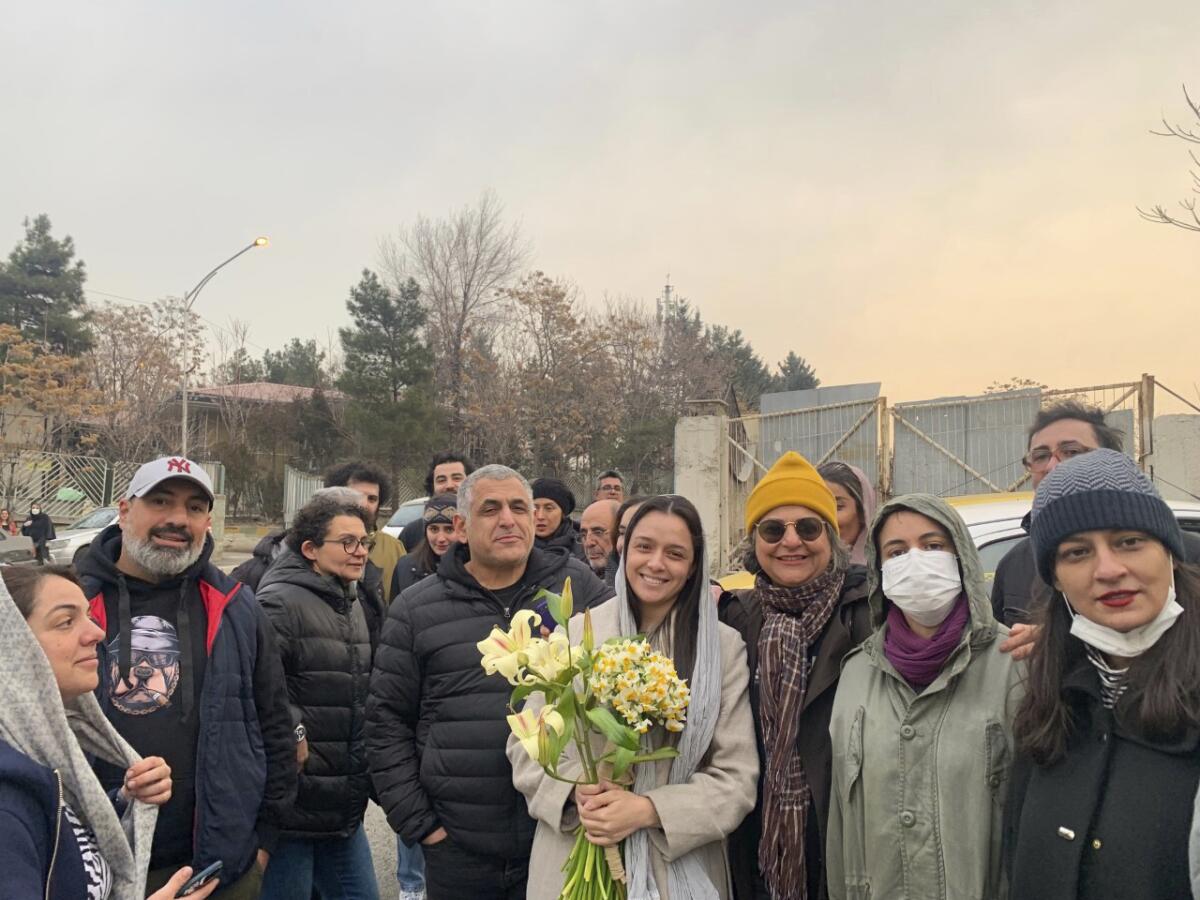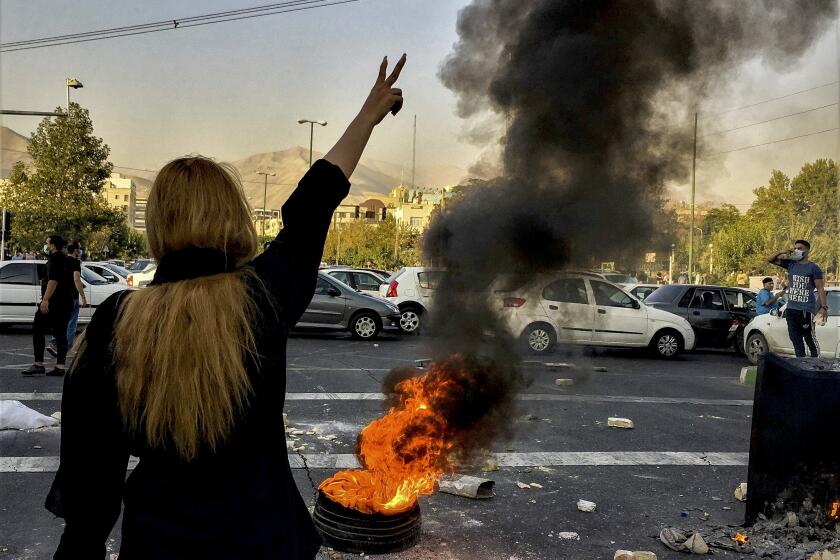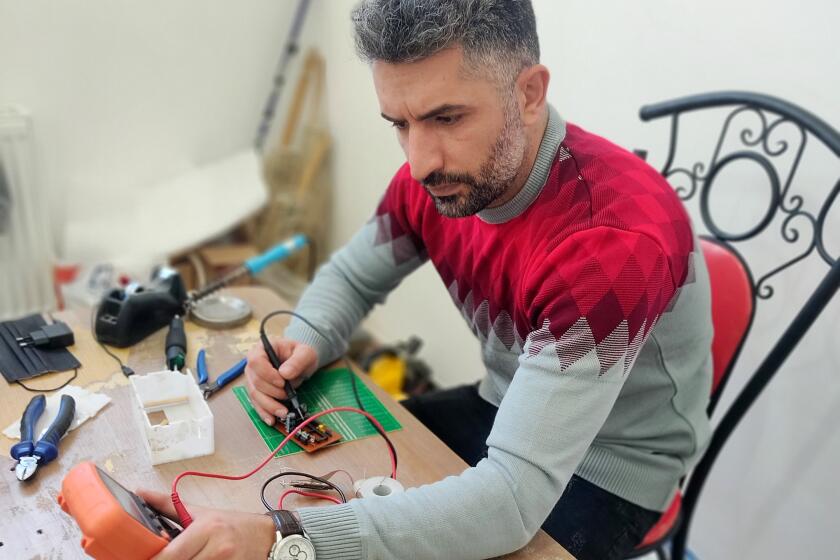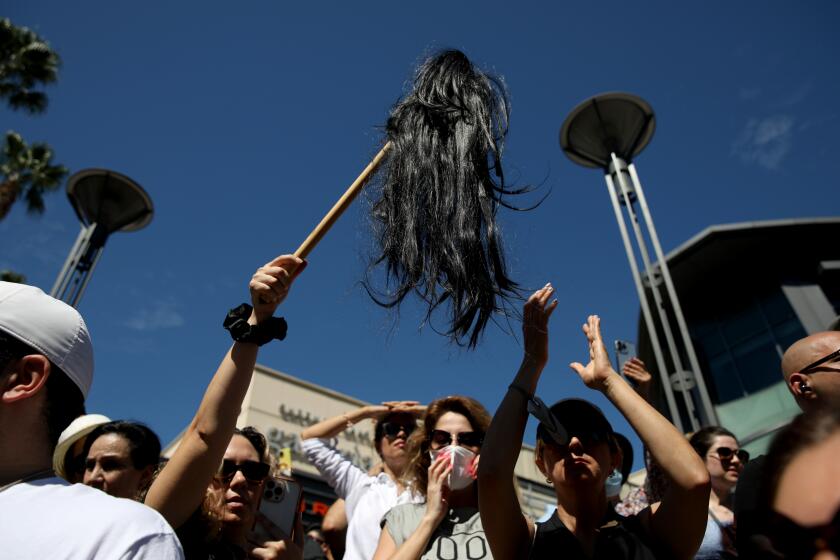Iran releases star of Oscar-winning film who was jailed over antigovernment protests

- Share via
DUBAI — Iran released a prominent actor Wednesday, nearly three weeks after she was jailed for criticizing a crackdown on antigovernment protests, local media reports said.
Iran’s semi-official ISNA news agency said Taraneh Alidoosti, the 38-year-old star of Asghar Farhadi’s Oscar-winning film “The Salesman,” was released on bail. Her mother, Nadere Hakimelahi, had earlier said on Instagram that Alidoosti would be released.
After her release from the notorious Evin Prison in Tehran on Wednesday, Alidoosti posed for a photo while holding flowers among her friends. No further details have been released about her case.
Alidoosti was among several Iranian celebrities who expressed support for the nationwide protests and criticized the authorities’ violent clampdown on dissent. She had posted at least three messages in support of the protests on Instagram before her account was disabled.
One message had expressed solidarity with the first man to be executed on charges linked to the protests, which were triggered by the death of a young woman in police custody and have escalated into widespread calls for the overthrow of Iran’s ruling clerics.
The protests mark one of the biggest challenges to the Islamic Republic since it was established after the 1979 revolution. Security forces have used live ammunition, birdshot, tear gas and batons to disperse protesters, according to rights groups.
Iran has executed a second prisoner convicted over crimes that officials say he committed during the anti-government protests shaking the nation.
Mohsen Shekari was executed Dec. 8 after being charged by an Iranian court with blocking a street in Tehran and attacking a member of the country’s security forces with a machete. A week later, Iran executed a second prisoner, Majidreza Rahnavard, by public hanging. He had been accused of stabbing two members of the paramilitary group Basij, which is leading the crackdown.
Activists say at least a dozen people have been sentenced to death in closed-door hearings over charges linked to the protests.
″His name was Mohsen Shekari,” Alidoosti wrote on an account with some 8 million followers before her arrest. “Every international organization who is watching this bloodshed and not taking action, is a disgrace to humanity.”
The Iranian reports of Alidoosti’s release did not say whether she has been charged with anything or if she will stand trial. It was also unclear whether she faces travel restrictions as part of the terms of her release.
Mohsen Chavoshi, one of Iran’s most famous singers, has helped rescue more than 50 people from the gallows in a country where justice can be harsh.
At least 516 protesters have been killed and more than 19,000 people have been arrested, according to Human Rights Activists in Iran, a group that has closely monitored the unrest. Iranian authorities have not provided an official count of those killed or detained.
Hengameh Ghaziani and Katayoun Riahi, two other famous Iranian actors, were arrested in November for expressing solidarity with protesters on social media. Voria Ghafouri, an Iranian soccer star, was also arrested that month for ’’insulting the national soccer team and propagandizing against the government.” All three have been released.
The protests began in mid-September, when 22-year-old Mahsa Amini died after being arrested by Iran’s morality police because she allegedly violated the Islamic Republic’s strict dress code. Women have played a leading role in the protests, with many publicly stripping off the compulsory Islamic headscarf, known as the hijab.
The protesters say they are fed up after decades of political and social repression. One of the main slogans has been “Death to the dictator,” referring to Iran’s 83-year-old Supreme Leader Ayatollah Ali Khamenei, who has been the country’s top leader for more than three decades.
From Tehran to Los Angeles, the act of cutting hair has become a form of resistance.
Iranian officials blame the protests on the U.S. and other foreign powers. State-linked media have highlighted attacks on security forces, while authorities have imposed heavy restrictions on coverage of the demonstrations, including periodically cutting off internet access.
Khamenei, who has said little about the protests, spoke about Islamic dress Wednesday in a meeting with women, saying the hijab is necessary but that those who do not “completely observe” the practice “should not be accused of being non-religious or against the revolution.”
Even before the protests, many Iranian women wore the headscarf loosely, and authorities sometimes eased off on enforcing it, particularly during the presidency of Hassan Rouhani, a relative moderate who governed from 2013 to 2021. His successor, the hard-liner Ebrahim Raisi, had moved to tighten the restrictions.
Alidoosti had criticized the Iranian government and its police force before this year’s protests.
Breaking News
Get breaking news, investigations, analysis and more signature journalism from the Los Angeles Times in your inbox.
You may occasionally receive promotional content from the Los Angeles Times.
In June 2020, she was given a suspended five-month prison sentence after she criticized the police on Twitter in 2018 for assaulting a woman who had removed her headscarf.
In “The Salesman,” she played a woman whose relationship with her husband fractures after she is sexually assaulted in their apartment. The story unfolds against the backdrop of a local staging of Arthur Miller’s classic play “Death of a Salesman,” in which the woman and her husband are cast as the main characters.
Alidoosti has also starred in the movies “The Beautiful City” and “About Elly.”
More to Read
Sign up for Essential California
The most important California stories and recommendations in your inbox every morning.
You may occasionally receive promotional content from the Los Angeles Times.
















